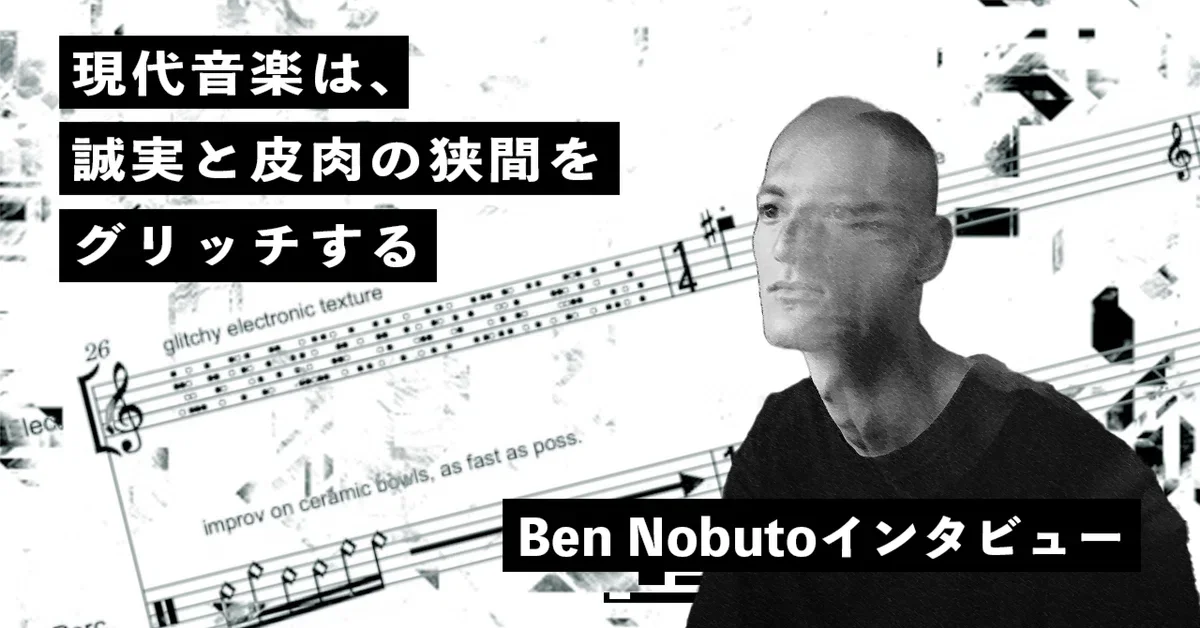Interview: note
Excerpt
— One thing that struck me in your work was the novelty of the notation itself. In SERENITY 2.0, for example, the traditional string quartet score is placed alongside commands that control electronics, producing a distinctive kind of ‘glitch’ through their interaction. In past interviews, you’ve also mentioned making active use of DAWs and sample libraries like Splice, even as you rely on traditional notation.
Ben Nobuto: When I write pieces that combine electronics with acoustic instruments, I feel like I’m working with two different scores. One is the traditional notated score, in Dorico, and the other is the digital score in Logic Pro, where I cut and paste samples and manipulate sounds. For me, composition is about moving back and forth between the two mediums, translating one into the other.
— Your music seems to share affinities with Digicore, Hyperflip, or the idea of “post-everything music.” At the same time, you place importance on moving between DAWs and traditional notation, so you’re not exactly a techno-utopian. For example, in SERENITY 2.0 and Live at Leighton House, alongside electronics you also use classical harmony, structure, and melody. Why is that?
Ben Nobuto: What feels really contemporary to me now is this sense of sincerity and irony constantly blending together. Recognising that a lot of the sounds that we use in our music might be old and clichéd (certain chords or sounds that have cultural baggage), but it doesn’t change the fact that they can still be moving to you.
So it’s this desire to express something genuine despite there always being this ironic or self-aware counter-voice. The boundary can blur and sometimes I don’t even know if I’m being sincere or ironic or somehow both. This ambiguity or contradiction feels very contemporary to me. I find it hard to explain, but that’s my feeling.
— Does that theme connect with your remix of Mizu-Irazu’s uturu? Personally, I felt that what you described—the contradictory feeling—made sense of many of the elements in your remix.
BN: Yes. I loved the original vocal stems so I mainly worked with those, cutting them up and playing with them like fragments. I wanted to strip away their semantic meaning and turn them into sound objects. The remix ends with a vocal loop playing over a simple piano accompaniment.
To me, there’s something sweet, maybe naive-sounding, about that ending. It feels a little sentimental, maybe half-ironic, but also genuine at the same time. So yes, it ties into that sincerity/irony tension.
Much of the sound material I used in that remix came from a Splice sample pack of camera noises - shutters, lens movements, mechanical clicks - cold, machine-like sounds. I like combining soft and hard sounds: the warmth of the voice with the cold, hardness of the camera noises. I find that kind of hybrid/cyborg texture so interesting.
— In your BBC Proms piece Hallelujah Sim., too, the narration guided and manipulated the entire orchestra. Meanwhile, in your Bento Beat series you’ve experimented with multilingual expression, including Japanese. How do you think about balancing clear narrative with texts whose meaning isn’t immediately accessible?
Ben Nobuto: That’s a good question - maybe that’s a contradiction. I’ve always loved the sound of the human voice, but attaching fixed meaning to it feels a bit restrictive. I’m more drawn to the voice as sound, as signifier, than to something that’s supposed to convey meaning.
When I write choral pieces, I try to avoid using pre-existing texts like poems and instead create my own - using fragments of conversation or random bits of text, cutting them up and reassembling them without worrying about semantic consistency.
— So in that way, words shed their meaning and become pure sound.
Ben Nobuto: Exactly. The sound of the speaking or singing voice remains, but meaning becomes secondary. It becomes surreal. That’s also why I use Japanese. For me, the language exists mostly as fragmented memories from my early childhood - bits and pieces floating around in my mind, disconnected, ungrammatical. And that actually matches with how I like to treat language in music.
For example, in BentoBeat #24, I use the Japanese phrase 「もういい加減んにやめて!」‘mō / ii kagen ni / yamete!’ (‘Cut it out, that’s enough!’). That’s what my mum used to say to me when I was playing too many video-games (laughs). But I don’t use it for its meaning; it’s more like retrieving a sound-sample stored in memory. Often if I can’t remember a word or phrase in Japanese I have to recall the memory of my mum saying it to me. So this fragmented treatment of the language feels honest to how my brain actually works.
